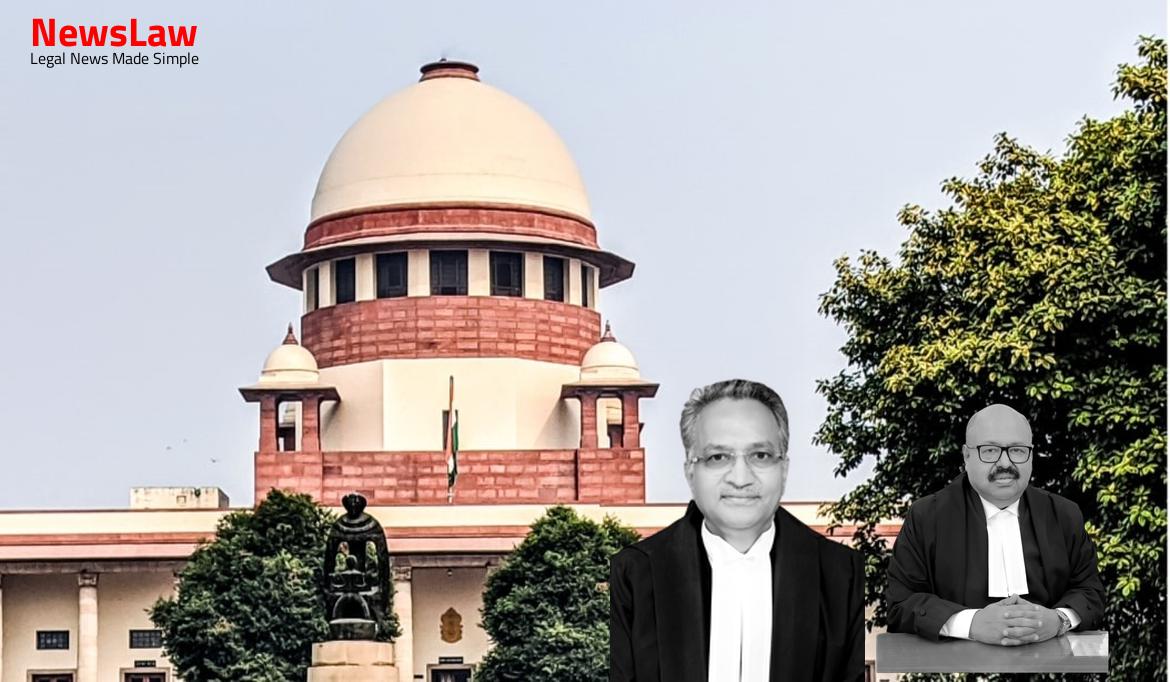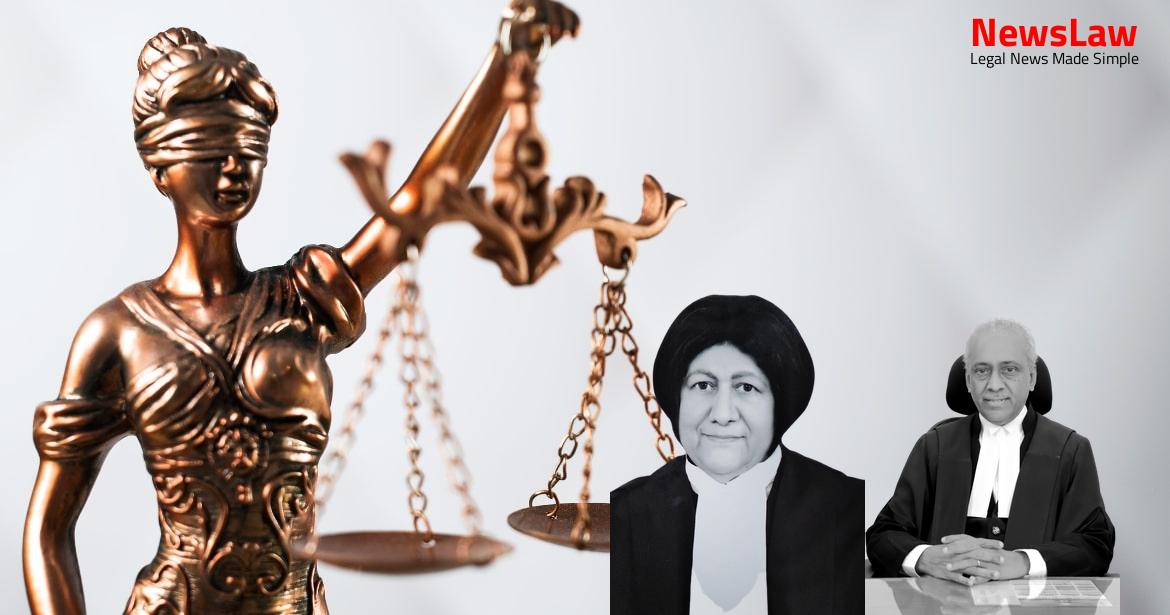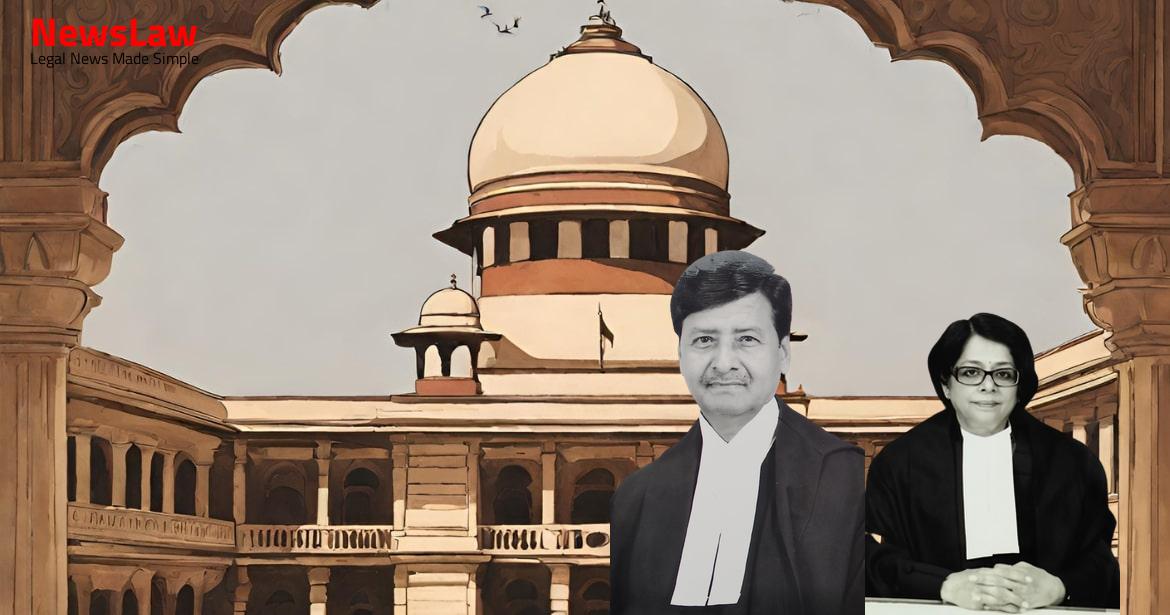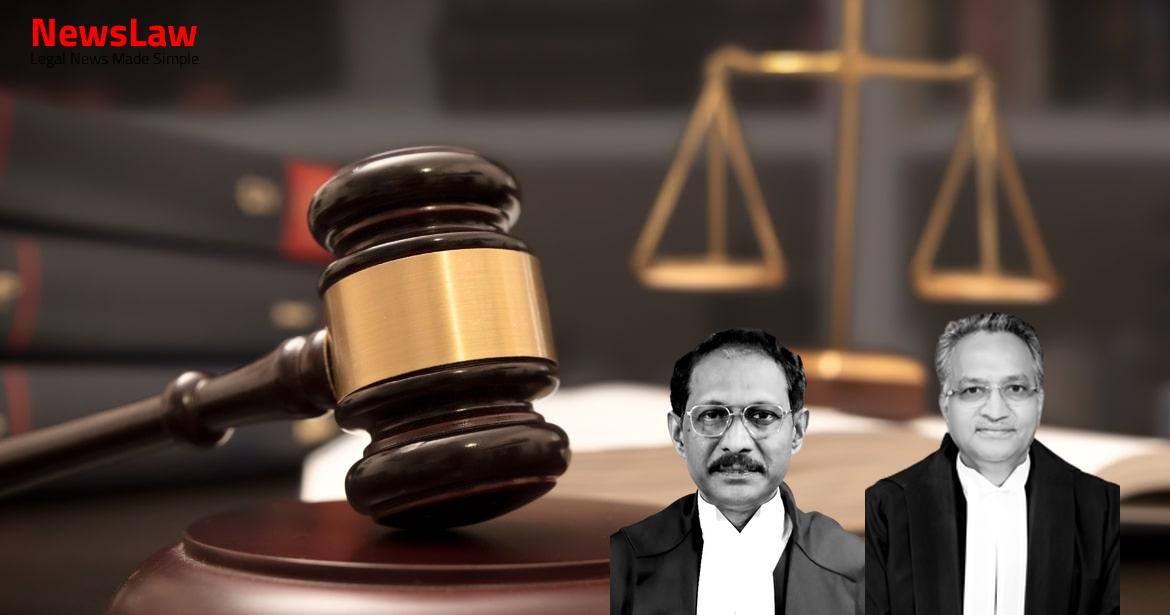In a recent property dispute case, the Court engaged in a meticulous legal analysis touching upon crucial aspects such as fraud, forgery, limitations, and the burden of proof. The judgment sheds light on the complexities of property disputes and highlights the importance of evidentiary standards in legal proceedings. Stay tuned to discover the key insights from the Court’s rigorous legal scrutiny.
Facts
- The former set of appeals arising out of SLP(C) Nos. 21326-21327/2019 were preferred by defendant Nos. 1, 4 to 6, while Nirmal Gill (respondent No 1) filed second appeals before the High Court.
- Two questions were formulated as substantial questions of law by the High Court after admitting the second appeal, and the trial Court dismissed both suits of the plaintiff.
- The sale deed dated 18.03.1996 in favor of defendant no. 10 executed by defendant no. 11 was deemed illegal and void by the plaintiff.
- The suits were resisted by defendant Nos. 1 and 3 to 6, along with subsequent purchasers contesting the suits by filing their written statement in C.S. No 173/2002.
- Disputes arose regarding the sale deeds purported to have been executed directly by the plaintiff in 1990, and the plaintiff claimed fraud perpetrated by her step brothers and step sister-in-law.
- The plaintiff, now deceased, filed suits seeking declarations against the defendants, leading to the evidence being recorded in the leading suit, C.S. No 11/2001.
- The plaintiff, through her legal representative, continued the litigation post her demise, claiming the transactions made by the plaintiff directly or through her attorney were valid.
- The suits involved disputes around a General Power of Attorney and subsequent sale deeds executed by defendant No 1 as the attorney of the plaintiff.
- Additional suits were filed by the plaintiff upon discovering more documents executed by her alleged attorney, leading to further disputes regarding the GPA and subsequent transactions.
- The plaintiff’s increased frequency of meeting her relatives, especially her step brothers, after her husband’s retirement in 1999, led to the discovery of property sale without her knowledge in a wedding function at Jalandhar.
- Further investigations by the plaintiff unveiled the existence of a GPA executed in 1963 in favor of defendant No 3 by all legal heirs, affecting the estate of Harbans Singh.
- The plaintiff discovered disputed documents executed in 1990 without her consent during a visit to the village.
- First appellate Court partly accepted the appeal, stating the appellant-plaintiff is the owner in possession of 9 marlas of land out of 4 Kanals 13 Mis.
- The findings of the trial Court regarding the ownership of 9 marlas of land were reversed and set aside.
- The first appellate Court upheld the trial Court’s findings on other material issues based on correct appreciation of facts and evidence.
- The first appellate Court modified the trial Court’s decision in C.S. No 11/2001, only in relation to the ownership of 9 marlas of land.
- The first appellate Court also upheld the trial Court’s judgment in reference to C.S. No 172/2002 in its entirety.
- The High Court, in a common Judgment, reversed the trial Court and first appellate Court’s findings, decreeing in favor of the plaintiff in R.S.A. Nos. 2901/2012 and 3881/2012.
Also Read: Land Acquisition Notification Process: Legal Analysis
Issue
- The issues in the suits filed by the plaintiff revolve around entitlement to declaration, maintainability, limitation, and relief.
- The main questions for consideration in the appeals are whether the suits were filed within limitation and whether the documents from 1990 were a result of fraud and forgery or not.
- The alleged fraud pertains to a 1990 GPA and sale deeds, where the plaintiff claims her signatures were obtained on blank papers under false pretenses.
- The plaintiff initially believed the documents were a misuse of her signatures but later claimed they were forged and registered through impersonation.
- The plaintiff’s suit’s maintainability is questioned based on the handling of fraud and limitations by the lower courts, as opined by the High Court.
Also Read: Classification of Creditor Claims in Insolvency Case
Arguments
- The argument presented by Nirmal Gill (respondent No 1 – plaintiff) was that the High Court correctly reversed the decisions of the trial Court and the first appellate Court due to evidence on record and in line with settled legal principles.
- The 1990 GPA was executed due to the plaintiff’s inability to manage the properties as a woman, and it was then executed in favor of another woman, defendant No 1, suggesting that subsequent purchasers should not have doubted before making purchases.
- Subsequent purchasers verified the title deeds and genuineness of the 1990 GPA before buying the plot at Jalandhar.
- The handwriting expert, Jassy Anand (PW10), concluded that the signatures on the document were the result of copied forgery.
- The aspect of payment of Rs.5 lakhs to the plaintiff’s son was not raised before the trial Court which raised questions.
- The plaintiff’s counsel argued that since the plaintiff did not admit the execution of the power of attorney dated 28.06.1990, the defense should have examined the attesting witnesses failing which adverse inferences should be drawn.
- The defense raised the presence of specific witnesses during the original attorney’s execution.
- The plea of fraud was not included in the plaint according to the Civil Procedure Code, barring its consideration.
- On the merits, the defense argued that the plaintiff’s evidence was self-contradictory regarding the 1990 GPA.
- The High Court noted discrepancies concerning the need for the 1990 GPA in the presence of the 1963 GPA, without considering the specific references to the shares in the suit property.
- The defense pointed out the lack of evidence from defendant No 1 due to residing abroad at the time, disregarded by the High Court.
- Expert examination found the plaintiff’s and attesting witness’s signatures to be genuine.
- Arguments were made about the plaintiff’s address being wrongly mentioned in the 1990 GPA, with implications on the plaintiff’s credibility.
- Questions were raised about the logic behind executing the GPA in favor of another woman if the reason was the plaintiff being a woman.
- The attesting witnesses of the sale deeds could not identify the plaintiff, casting doubt on the authenticity of the transactions.
- The plaintiff claimed that the attesting witnesses were not known to her, further weakening the defendant’s case.
- Defendants failed to prove that they had means to pay the sale consideration, as highlighted by their need for loans on joint lands.
- The defendants’ claim that the sale consideration was paid from the proceeds of selling another land belonging to their mother lacked evidence.
- Attempts to challenge the Special Power of Attorney dated 29.06.1990 were futile as the document was not available in the Sub-Registrar’s office.
- Challenges to the 1963 GPA were dismissed due to its age, being over thirty years old.
- Defendants could not provide evidence of the existence of the property from which the sale consideration was allegedly paid, casting further doubt on their claims.
- Defendants relied on expert opinion and testimonies to validate the signatures on the documents, but these claims were countered by the plaintiff’s scribe (PW4) who stated he prepared the documents as per the plaintiff’s instructions.
Also Read: Legal Analysis of Stock Exchange Membership Dispute
Analysis
- The plaintiff failed to prove that her signatures on the subject documents are forged.
- Expert opinions are not a binding piece of evidence and need to be corroborated with other evidence.
- The intention of the parties was that the sale deed should be complete on the vendor’s signature only.
- The actions of the scribe cannot be burdened on the defendants.
- The evidence presented by the plaintiff in reference to the signature is of no avail due to divergent opinions.
- The expert witness for the defendants opined that the signatures were by the plaintiff herself.
- The High Court observed that the defendants abused their position of active confidence.
- The High Court’s reversal of findings on evaluation of evidence was upheld.
- The attesting witnesses of the sale deed were not examined.
- The sale deed was attested by Teja Singh Lamberdar and Anoop Singh (DW3).
- Registered documents are presumed to be validly executed and valid in law.
- Hypersensitive approach should not be taken in cases of delay in recording evidence.
- The suits being barred by limitation was an error.
- Fraud can have an effect on the limitation period as per Section 17 of the Limitation Act, 1963.
- Two ingredients need to be pleaded and proven to invoke Section 17 of the 1963 Act.
- The signature of the vendee is not mandatory in a sale deed as per case law.
- The burden of proof lies on the plaintiff to prove the existence of facts.
- The need for tangible evidence to prove specific facts.
- Shifting the burden of proof requires more than just pleading a fiduciary relationship.
- The agreement of sale can be enforced by the purchaser in case of breach by the vendor.
- A document required by law to be attested cannot be used as evidence without at least one attesting witness being called to prove its execution, if the witness is alive, subject to court process, and capable of giving evidence.
- An attesting witness does not need to be called to prove the execution of a document, other than a will, if it has been registered under the Indian Registration Act, 1908, unless its execution is specifically denied.
- In cases where the execution of documents is denied, the party denying it must examine the attesting witnesses of the disputed documents to establish their claim.
- Standard of proof in civil disputes is preponderance of probabilities, not beyond reasonable doubt.
- Discrepancies in the 1990 GPA may create doubt, but without tangible evidence of fraud provided by the plaintiff, the doubt does not carry weight.
- Testimony of attesting witness, scribe, and independent witnesses supports defendants’ case, dispelling any doubts and favoring defendants.
- Failure to establish fraud means the suits are barred by limitation as per law.
- Since the 1990 GPA has been proven, subsequent purchasers have valid title.
- Trial Court and first appellate Court properly appreciated the evidence, and their view should not have been disturbed by the High Court in second appeal based on mere surmises and conjectures.
- Appeals allowed, High Court judgment and decree set aside.
Decision
- The judgment and decree passed by the first appellate Court is hereby restored.
- No order as to costs.
Case Title: RATTAN SINGH Vs. NIRMAL GILL (2020 INSC 641)
Case Number: C.A. No.-003681-003682 / 2020



